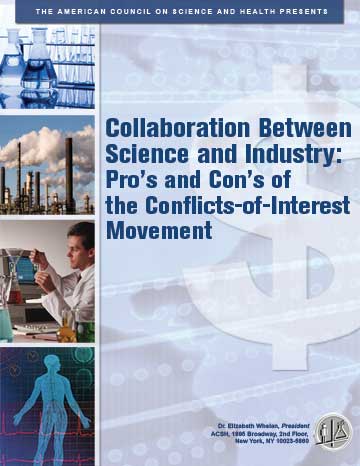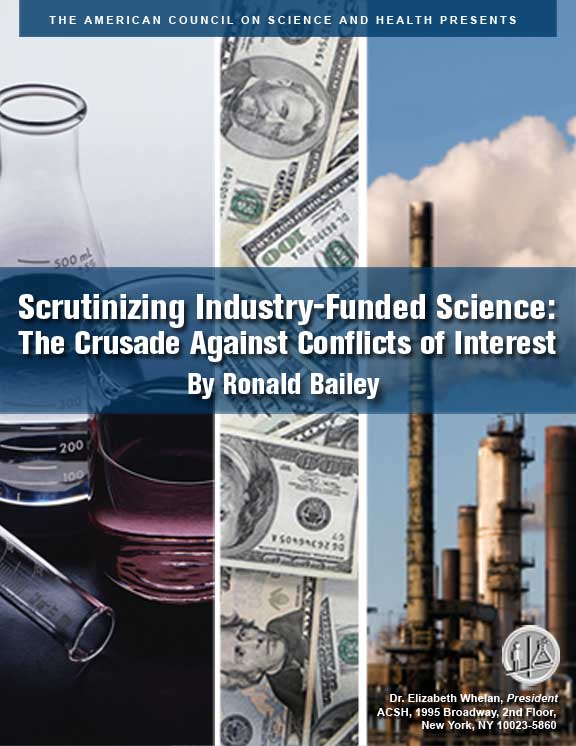
 April 2, 2008 -- New York, NY. scientists' ties to indus
April 2, 2008 -- New York, NY. scientists' ties to indus
 April 2, 2008 -- New York, NY. scientists' ties to industry and point to a Scientific progress has long benefited from collaboration between science and business -- so concludes a new report from the American Council on Science and Health (ACSH), a non-profit group critical of unscientific claims. Nevertheless, self-appointed "consumer advocacy" groups now routinely assert that science is being perverted byhandful of scandals to make their case -- despite the lack of evidence showing that ties to industry are especially corrupting.
April 2, 2008 -- New York, NY. scientists' ties to industry and point to a Scientific progress has long benefited from collaboration between science and business -- so concludes a new report from the American Council on Science and Health (ACSH), a non-profit group critical of unscientific claims. Nevertheless, self-appointed "consumer advocacy" groups now routinely assert that science is being perverted byhandful of scandals to make their case -- despite the lack of evidence showing that ties to industry are especially corrupting.
"Conflicts of interest activists assert that ties between researchers and industry are harming patients and consumers," writes science journalist Ronald Bailey in ACSH's report Scrutinizing Industry-Funded Science: The Crusade Against Conflicts of Interest. "In addition, the anti-industry activist groups are trying to exclude academic researchers who have any ties whatsoever to industry from government scientific advisory boards." That side of the story is by now a familiar one. "However," concludes the ACSH report, "even the activists' own flawed studies can't demonstrate that industry 'influence' is distorting the decisions made by those boards."
Furthermore, the activists' crusade has costs: "The campaign to purge any experts with industry ties -- no matter how slender -- from advisory panels is chilling scientific debate and depriving regulators and the public of valuable insights," continues the ACSH report, which is also available in a condensed version, Collaboration Between Science and Industry: The Pro's and Con's of the Conflicts-of-Interest Movement.
Often, scientists have track records as occasional consultants to industry simply because they are experts in their field. By restricting regulatory decisions at governmental bodies such the Food and Drug Administration or Environmental Protection Agency only to those scientists who had done no such consulting, we are slanting the scientific policy debate in another direction: toward those who either lacked the expertise to be sought out by industry or who have a strong political animus against industry that may itself be a greater threat to objectivity than past consulting duties.
"If a scientist was once asked by a drug company to give his or her opinion about a drug, some groups would say all that scientist's peer-reviewed research is now tainted," says ACSH medical director Dr. Gilbert Ross. "But the critics themselves tout the work of scientists who may be funded by foundations dedicated to promoting environmentalism or organic food, and no one thinks to ask whether they might be less than impartial themselves."
"A new Scientific McCarthyism is alive and well in America today," says Dr. Elizabeth Whelan, president of ACSH. Singling out ties to industry makes it seem as if only the taint of business can impair scientific judgment. "There are myriad non-financial factors that can influence scientists and impair their objectivity, from closely held political convictions to the desire for glory in a given field."
ACSH's full-length report and consumer-friendly condensed report on scientific "conflicts of interest" conclude that while disclosure is perfectly reasonable, treating any and all ties to industry as corrupting and other sources of bias as irrelevant -- even membership in anti-industry activist groups -- is a formula for scientific stagnation and skewed debate.


